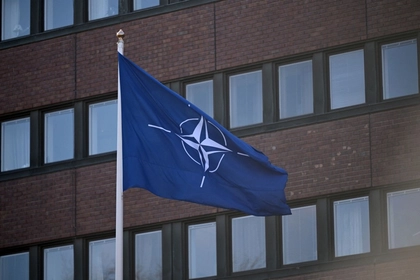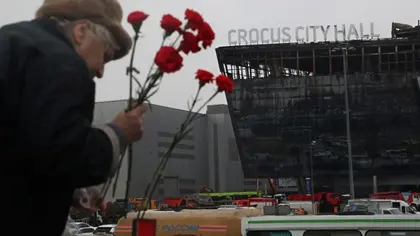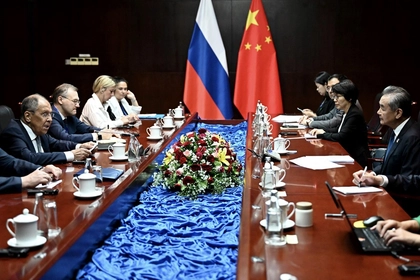While European countries sent condolences and largely stayed away from commenting further on its implications, some fear the Russian terrorist attack could lead Putin to a more forceful response in Ukraine.
The Islamic State (IS) released new videos of the attack on the Crocus City concert hall outside Moscow on Friday (22 March) that left 137 people dead, corroborating their claims of being behind the incident despite Russia’s attempts to blame it on Ukraine, something Kyiv denies.
JOIN US ON TELEGRAM
Follow our coverage of the war on the @Kyivpost_official.
The Moscow shooting is the deadliest IS-claimed attack to date on European soil and in Russia since the 2004 Beslan school siege. Four of the alleged perpetrators have now been brought before a Moscow court.
Russia experts described Friday’s attack as a failure of the country’s distracted security services.
“The FSB obviously had their priorities wrong. They had their main resources on Ukraine and the domestic opposition,” Mark Galeotti, an expert on the Russian security services, told the Guardian.
Condolences, without addressing Putin
The EU said it was “shocked and appalled” by the attack. “The EU condemns any attacks against civilians. Our thoughts are with all those Russian citizens affected,” EU lead spokesperson for foreign affairs, Peter Stano, said.
European Commission President Ursula von der Leyen and European Council President Charles Michel also condemned the attack, along with NATO spokesperson Farah Dakhlallah.

Russian Drone Debris Found in Romania, NATO Says No Sign of Intentional Attack
Europe will keep a “wait and see” stance on the matter pending further developments on the Russian side, a Southern European diplomat, contacted by Euractiv, said.
French President Emmanuel Macron said he “strongly condemns the terrorist attack claimed by the Islamic State” in a statement released by the Elyseé Palace, also expressing solidarity with the victims and the Russian people.
France’s government, meanwhile, increased its security alert warning to the highest level on Sunday (24 March).
In Germany, the Foreign Ministry said, “The background must be clarified quickly. Our deepest condolences go out to the families of the victims,” while Italy’s Prime Minister Giorgia Meloni condemned what she said was an “odious act of terrorism”.
“The horror of the massacre of innocent civilians in Moscow is unacceptable,” Meloni said, expressing her “full solidarity with the affected people and the victims’ families”.
Spain said it was “shocked” by the attack, saying it “condemns any form of violence”.
Concern about war implications
As the attack shatters Vladimir Putin’s security promise to Russians, observers expect him to look for an easy win elsewhere, including a more forceful push against Ukraine.
The Kremlin will try to escape responsibility by using propaganda to suggest the involvement of Ukraine and the West, which many Russian citizens will likely believe because they live in a controlled media environment, Tsvetlin Yovchev, former head of the Bulgarian counter-intelligence agency DANS, told Nova TV.
“Russia underestimated, ignored and even mocked the signal of a terrorist attack sent by the US […] You can’t have basic security measures in a place like this, where more than 6,000 people gather. It turned out that there weren’t even police patrols there,” he said.
The attack brought back memories of past decades, including the wars against Chechen separatists in the 1990s and 2000s that helped enable Putin’s rise to power.
Putin used most of those violent incidents, like the 2002 Moscow theatre hostage crisis or the 2004 Beslan school siege, to justify the rollback of political freedoms or crackdown on Chechen separatists.
Ukraine’s Foreign Minister Dmytro Kuleba called Putin a “pathological liar” on Sunday, adding the Kremlin’s “only goal is to motivate more Russians to die in their senseless and criminal war against Ukraine, as well as to instil even more hatred for other nations, not just Ukrainians, but the entire West”.
‘No links with Ukraine’
Italy’s Foreign Minister Antonio Tajani called for calm, underlining Moscow’s attempts to instrumentalise the attack.
“After the terrorist attack in Moscow, which we condemned, we must always be calm, prudent, avoid an escalation,” Tajani said speaking to journalists on the sidelines of a Forza Italia election initiative.
“I believe that after every verification and every assessment, considerations must be made, which in any case must push all parties to be very prudent,” Tajani added.
“We must invite Russia not to instrumentalise the attack,” he said. “We are living in a moment of great international tension, so we must be very prudent and verify all the information,” he stressed.
Similarly, Italy’s defence minister, Guido Crosetto (Fratelli d’Italia), ruled out Ukraine’s involvement.
“There are no links between Ukraine and Isis. Nor would they be allowed by the allies of the Ukrainians, who consider ISIS in the same way as Hamas, a terrorist organisation, to be fought in every way. For Kyiv even to think of helping Isis would be tantamount to double suicide”, he told Il Messaggero.
Germany’s CDU/CSU foreign policy spokesman Roderich Kiesewetter told Bild am Sonntag that by blaming Ukraine, Russia shows that it plans “to use this terrorist attack strategically for its warfare […] a new wave of mobilisation in Russia likely”.
Poland’s Defence Minister Wladyslaw Kosiniak-Kamysz said Poland was constantly monitoring the situation.
“I am in contact with the general staff of the Polish Army, all services and our allies. We are analysing this situation regarding its possible impact on Poland’s security.”
You can also highlight the text and press Ctrl + Enter







